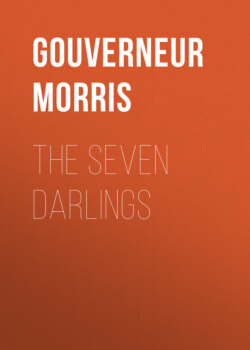Читать книгу The Seven Darlings - Gouverneur Morris - Страница 6
На сайте Литреса книга снята с продажи.
III
ОглавлениеTable of Contents
If we except Arthur, whose knowledge of the Adirondack woods and waters was that of a naturalist, Lee and Gay were the sportsmen of the family. They had begun to learn the arts of fishing and hunting from excellent masters at the tender age of five. They knew the deeps and shallows of every lake and brook within many miles as intimately as a good housewife knows the shelves in her linen closet. They talked in terms of blazes, snags, spring holes, and runways. Each owned a guide boat, incomparably light, which she could swing to her shoulders and carry for a quarter of a mile without blowing. If Lee was the better shot, Gay could throw the more seductive fly.
There had been a guide in the girls' extreme youth, a Frenchman, Pierre Amadis de Troissac, who had perhaps begun life as a gentleman. Whatever his history, he had taught the precious pair the rudiments of French and the higher mysteries of fishing.
He had made a special study of spring holes, an essential in Adirondack trout-fishing, and whenever the Darlings wanted trout, it had only been necessary to tell De Troissac how many they wanted and to wait a few hours. On those occasions when he went fishing for the larder, Lee and Gay, two little roly-polies with round, innocent eyes, often accompanied him. It never occurred to De Troissac that the children could mark down the exact places from which he took fish, and, one by one and quite unintentionally, he revealed to them the hard-won secrets of his spring holes. The knowledge, however, went no further. They would have told Phyllis, of course, if she had been a sport. But she wasn't. She resembled Lee and Gay almost exactly in all other ways; but the spirit of pursuit and capture was left out of her. Twice she had upset a boat because a newly landed bass had suddenly begun to flop in the bottom of it, and once, coming accidentally upon a guide in the act of disembowelling a deer, she had gone into hysterics. She could row, carry a boat, swim, and find the more travelled trails; but, as Lee and Gay said: "Pill would starve in the woods directly the season was over."
She couldn't discharge even a twenty-two calibre rifle without shutting her eyes; she couldn't throw a fly twenty feet without snarling her leader. The more peaceful arts of out-of-doors had excited her imagination and latent skill.
In the heart of the woods, back of The Camp, not to be seen or even suspected until you came suddenly upon it, she had an acre of gardens under exquisite cultivation, and not a little glass. She specialized in nectarines, white muscats of Alexandria, new peas, and heaven-blue larkspur. But, for the sake of others, she grew to perfection beets, sweet corn, the lilies in variety, and immense Japanese iris.
As The Camp was to be turned into an inn which should serve its guests with delicious food, Phyllis and her garden became of immense importance and she began to sit much apart, marking seed catalogues with one end of a pencil and drumming on her beautiful teeth with the other.
Negotiations had been undertaken with a number of periodicals devoted to outdoor life, and a hundred schemes for advertising had been boiled down to one, which even Arthur was willing to let stand. To embody Mary's ideas of a profitable proposition into a page of advertising without being too absurd or too "cheap," had proved extremely difficult.
"We will run The Inn," she said, "so that rich people will live very much as they would if they were doing the running. One big price must cover all the luxuries of home. We must eliminate all extras—everything which is a nuisance or a trouble. Except for the trifling fact that we receive pay for it, we must treat them exactly as papa used to treat his guests. He gave his guests splendid food of his own ordering. When they wanted cigars or cigarettes, they helped themselves. There was always champagne for dinner, but if men preferred whiskey and soda, they told the butler, and he saw that they got it. What I'm driving at is this: There must be no difference in price for a guest who drinks champagne and one who doesn't drink anything. And more important still, we must do all the laundering without extra charge; guides, guide boats, guns, and fishing-tackle must be on tap—just as papa had everything for his guests. The one big price must include absolutely everything."
Added to this general idea, it was further conveyed in the final advertisement that the shooting was over hundreds of thousands of acres and the fishing in countless lakes and streams. And the last line of the ad, as had been previously agreed, was this:
